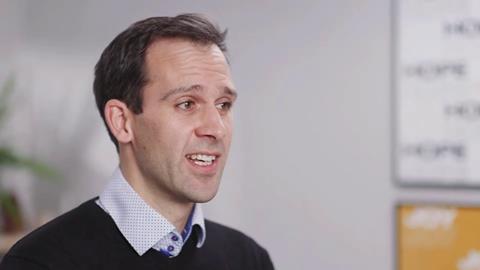When Jonny Gumbel contracted ME in his early 20s, he had to drop out of university and was bed ridden for a year. But wrestling with the question of who he was when everything else was taken away led to a deep understanding of God’s unconditional love

Who would you be if all the normal markers of your identity were stripped away?
This was the question I was confronted with in my early 20s. After feeling particularly tired over a long period, I discovered some lumps in my neck which turned out to be evidence of glandular fever. No matter how much I rested, I didn’t seem to get any better.
After a few months, I was diagnosed with chronic fatigue syndrome, or ME. I had to drop out of university, stopped seeing friends, playing sport or doing any of the things I enjoyed. For about a year, I did very little other than lie in bed, hoping I would eventually recover.
At a low point during this period, a friend came to see me. He told me that he thought this was going to be an important period of my life. Then he looked at me and said: “You don’t know who you really are yet, but you are about to find out.” He was right. During that time, I wrestled with the crucial question of who I was without my friends, my studies, my hobbies or my health. And the answer that began to emerge - slowly but clearly - was that I am one who is loved by God.
To be a Christian is to be one who knows: I am loved therefore I am
Being a Christian is not just about what we think, though it involves the transformation of our minds. It is not only about what we feel, though it involves an experience of God himself. Nor is it about what we do, though it radically alters the way we live. It is not even about the group to which we belong, though it redirects and reshapes our relationships.
Being a Christian is about something even more fundamental than this: it is about our identity. It redefines who we are.
Defined by love
I love the way that Paul addresses the Christian community in Rome. In his letter to them, he could have mentioned all kinds of things. They were Christians living in the capital city of the most powerful empire the world had ever known. He could have addressed them as the world rulers, law makers, those at the center of culture, power and civilization. He could have addressed them as those in a city known for cruelty, violence, corruption and immorality. Instead, he writes very simply: “To all in Rome who are loved by God.” (Romans 1:6). For Paul, the most important thing about them is not their achievements or failings, their strengths or weaknesses, but that they are loved by God. They are in Rome, but there are not defined by Rome; they are defined by being loved by God.
This was the life-changing revelation that emerged from my illness. It wasn’t dramatic or sudden. It emerged slowly - but consistently - in my heart and mind as I tried to listen to the voice of God over those months of doing almost nothing.
Identity crisis
We live in a culture in which people seem to be desperately trying to establish their identity. It’s the theme of several Disney films from The Lion King to Moana. We tend to form our sense of self through either external factors (our family, our nationality, the opinion of others, our place in a group of friends) or internal factors (our personality, desires or ambitions). But the answer to our search for our identity is not found primarily in what is inside of us, nor in who is around us, but in the one who is above us. Our identity comes from the love of God.
The love of God shows us who we are. We are not defined by our past, our family, our personality, our sexuality, our gender, our job, our friends or the opinions of other people; we are defined by being loved by God. Descartes famously said: “I think therefore I am,” but to be a Christian is to be one who knows: I am loved therefore I am.
To know this is totally liberating. It brings unshakeable security. Whether we succeed or fail, whether people reject us or accept us, we are loved by God. We do not need to compare ourselves or compete with others. We don’t need to prove ourselves or pretend to be something we’re not. We don’t need to try to impress anyone.
Uncomfortable change
The process of learning this is not always comfortable. God wants us to know this love which shapes our identity, so there may be times when he deliberately challenges or removes the things around which we have (wrongly) formed our identity.
I wrestled with the question of who I was without my friends, studies, hobbies or health
The journey of the Christian life is one in which our identity becomes more and more defined by the love of God. The author of John’s Gospel, writing near the end of his life and recording the stories of his three years with Jesus, never refers to himself by name. He mentions the other disciples’ names but the author, who seems to have had a particularly close relationship with Jesus, simply refers to himself as “the disciple whom Jesus loved.” Here was an apostle, a leader of the early Church, one of the key eyewitnesses of Jesus’ life and death and resurrection - and yet, for him, the only thing that mattered about himself was that he was loved by God.
Before we have done anything, achieved anything, tried or failed at anything, we are loved by God. If everything else were stripped away from us, this would remain: we are loved by God. “God is love.” (1 John 4.8). That is his identity. And we are loved. That is ours.



































No comments yet